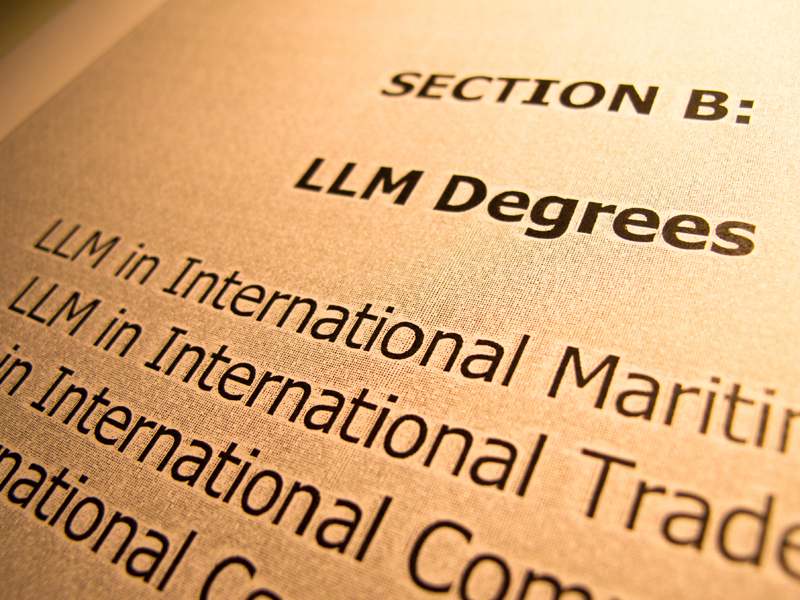
What LL.M. Program Is Worth It?

Law schools offering LL.M. programs want to attract attorneys and foreign lawyers with different interests and ambitions. That is why LLM programs offer degrees in different subject matters, from international law, space and air law, fashion law, entertainment law, intellectual property law, global food law, and indigenous peoples law. There is an LL.M. program for any law you want to work in; there is an LL.M. program for it. However, there are only two instances when an LL.M. degree is valuable.
Attorneys who plan on practicing tax law are among the small group of lawyers who can truly benefit from getting this type of degree. Many law firms even require this additional degree because tax law is extremely specialized, and constant learning is necessary.
Another group of lawyers that can benefit from getting an LL.M. degree is a group of foreign lawyers who already work for an American law firm from abroad and want to now move to the States. Without the security of a job in the U.S., signing up for an LLM program is not worth it. Even when a foreign attorney has an LL.M. degree, law firms will always choose American attorneys because they have fewer obligations and responsibilities with hiring them. They do not have to sponsor them or arrange complicated international moves and deal with other immigration issues.
Apart from these two situations, getting an LL.M. degree is not the best decision for your legal career. It shows potential employers that you have not studied at a top law school were studying abroad or do not want to start practicing but rather keep studying behind a desk. Apart from not sending the greatest message about you, LL.M. programs are about lawyers losing money. Law students considering these LL.M. programs are getting scammed out of their money and left with useless degrees on their resumes that do more harm than good for their careers.
Main Reasons Why LL.M. Degrees Are Not the Way To Get Into Law Firms
LL.M. Degrees Are Not Prestigious Even When From the Top Law Schools

Many attorneys falsely believe that getting an LL.M. degree from Harvard or NYU means getting a law degree from Harvard Law School or NYU Law School. After getting a law degree from a less than stellar law school, they often sign in to an LL.M. program from a university with a prestigious name and believe it will help them get positions in major firms. However, that is very far from the truth.
LL.M. programs do not have the same admissions standards as Juris doctor programs and are not as competitive because they do not count toward the law school's ranks. Law firms are well-aware of this fact, and their hiring requirements reflect that. The most prestigious firms are full of attorneys who went to prestigious law schools and did not have to get any LL.M. degrees afterward. When firms see an attorney (who is not a tax lawyer) with an LL.M. degree on their resume, they get suspicious even if the attorney did great in a law school. They will wonder what prompted the attorney to go into an LL.M. program because they do not view it as a logical career choice.
The standards in LL.M. programs vary a lot, and even some of the best ones allow distant online learning. Such a lack of hands-on experience and training in the program can put firms off, and many will not consider attorneys with such a degree.
An LL.M. Degree Does Not Prepare You For the Legal Profession

The most important skills attorneys need in the legal industry are obtained through practice and working hands-on in a law firm. They cannot be taught in school. Law schools can only teach the importance of research, understanding complex issues, being diligently detail-oriented, and adapting to new situations very quickly. However, attorneys have to perfect these skills as they practice law.
An LL.M. on top of law school does not make sense. It keeps you away from getting real-world experience and keeps you in the academic world of law professors, which is so different from the hands-on world of law firms.
For instance, an intellectual property LL.M. is something that does not make any sense. You need to have a lot of knowledge in technology and science to work as a good IP lawyer. Yet, so many people from different unrelated fields are being conned into thinking that if they pursue an intellectual property LL.M., they will be able to find a job in that practice area. That is just not true.
Law Schools Get a Lot of Money From LL.M. Programs, So They Promote Them

Law schools need money to function, and LL.M. programs are a great source of those. While J.D. programs have to publish their results, so they have to be very careful about who to accept if they want to belong to the best law schools in the country, LL.M.s are not required to do so. These programs will accept anyone who has the money to pay, and they do not care about the results they get or the knowledge they take away.
That is also why these programs do not have courses based on what attorneys need in their professional lives but based on demand. If enough people want an LL.M. course in space law or European law, the program will add it because they know that it means money for them.
Many law schools also do not create any new courses for LL.M. programs than those they already offer. The programs are not regulated and do not have to report to anyone nor prove that their students have good results. Many of these programs hand out useless degrees and cash in the checks.
The Best and Most Successful Lawyers Do Not Have LL.M. Degrees
The most famous attorneys and those in the highest circles everyone looks up to rarely (if ever) have an LL.M. degree on their resumes. There might be a few tax LL.M. attorneys with great legal careers; however, apart from those, you would have difficulty finding a prestigious lawyer with an LL.M. degree. The best lawyers always want to get into the practice as soon as possible, so they do not want to spend more time (and money) studying at school instead of working after graduating from law school. Working in a law firm will teach them much more skills they will utilize in their profession than any additional degree. Moreover, they will not require the attorney to pay them a ton of money but rather pay a fair salary. Going into an LL.M. program is a waste of time that could be spent gaining real-world practice the best attorneys cannot afford.
Law Firms Might Mistake You for a Foreigner
Looking at the statistics of what types of attorneys go into an LL.M. degree, you would see that the majority of them are foreigners. That is why law firms often assume that anyone with this degree is not American and probably comes from abroad. Many firms prefer to hire domestic attorneys because it is logistically easier for them, so such a degree can even cost you a job. You can try to explain to the firm that you are not from abroad; however, the firm already might have considered your application as not serious enough.
Some lucky foreign attorneys who work in an international law firm based in the U.S. can benefit from this degree to practice law in New York or another big market like California. However, there are not that many other cases where it can be a benefit.
Getting an LL.M. Often Shows You Are Not Confident in Your Skills
Law schools spit out hundreds of graduating law students every year; however, some feel the need to get an additional title to be marketable. Firms see in this need that these attorneys feel like they are lacking somewhere. They need to compensate for it by attending an LL.M. program. The degree does not give you an upper hand, but the opposite - it shows everyone you feel like you lack in some department. Either you did not go into a law school that is prestigious enough, you have done poorly in your law school, or you immigrated to America, and you need an American degree to work here. None of it is what you want to display to your potential employer. Clients only want confident attorneys to represent them, you cannot start showing that you do not believe in yourself right from the start of your legal career.
LL.M.s Are "Scams," and Attorneys Should Not Get Scammed

Most LL.M. programs exist only to make money out of lawyers' pockets. They are scams useless for most attorneys even though they promise new profit opportunities and never deliver what attorneys expect. At the same time, clients hire attorneys to help them after being scammed or avoid making such mistakes altogether. How can an attorney who got scammed themselves help clients in situations like these? That is not the best selling point, and most clients will think twice before putting their fate into someone like that. Having a degree from an LL.M. program reveals that you are prone to making decisions that do not benefit you, and those are not good characteristics for advocating for others.
Conclusions
As a legal recruiter with BCG Attorney Search, I work with many different law students and attorneys and know what usually helps them get the best positions in law firms. While I do not like to talk badly about LL.M. courses and programs because most attorneys go into them thinking they are doing something good for their careers, the truth is that they are useless for attorneys in most cases. These programs promise to teach attorneys something additional to help them provide better legal services to their clients; however, that is not the case. Attorneys pay a lot of money for a degree that will hurt them more than help them, and they do not realize it. If you are not in tax law or a foreigner with a contract with an American law firm, you will do much better if you skip the LL.M. and focus more on gaining real-world experience practicing law. It will save you a lot of money you would otherwise spend on the degree and help you get experience, start earning money, and set you up for a successful legal career.




